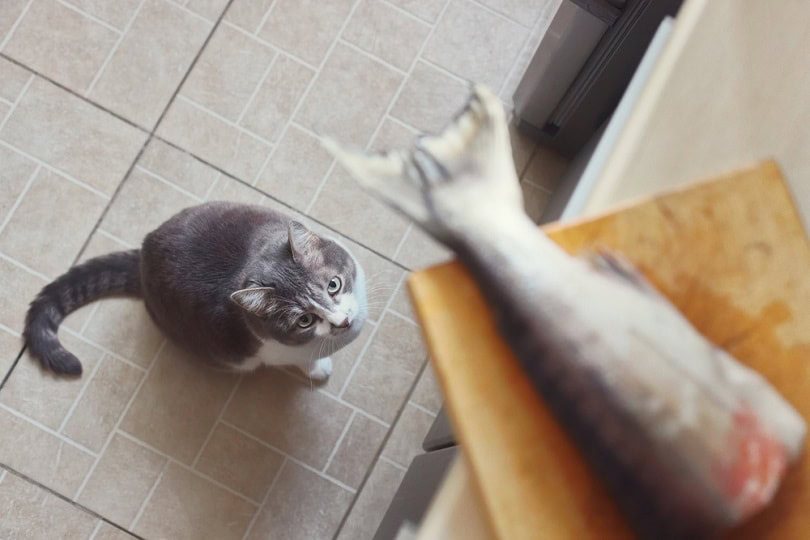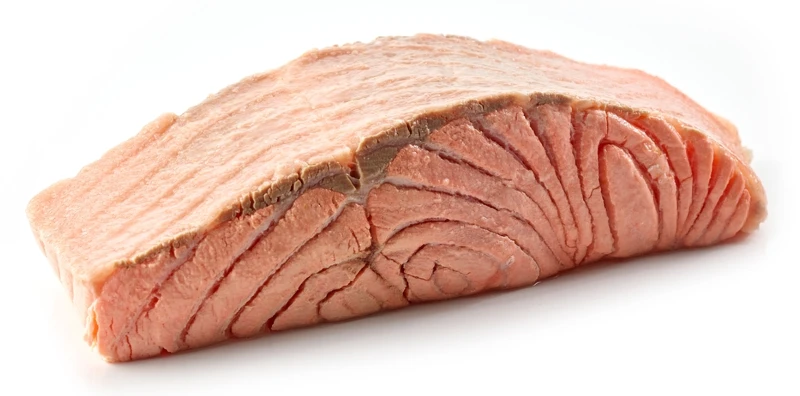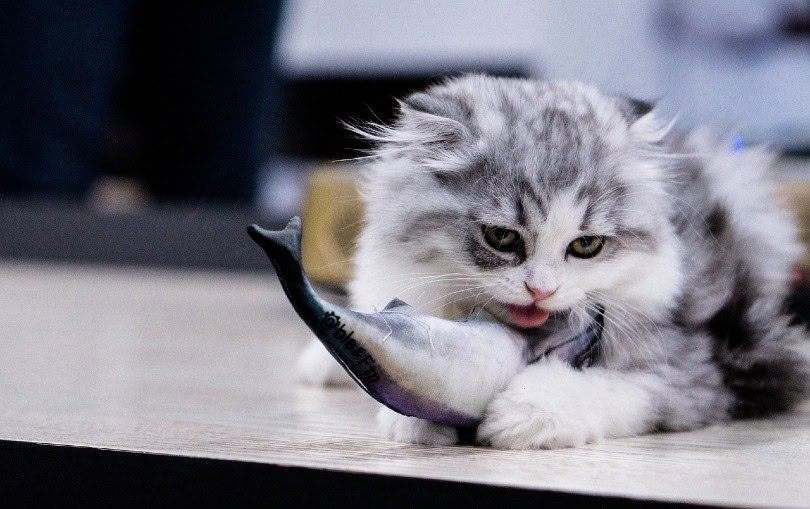VET APPROVED

The information is current and up-to-date in accordance with the latest veterinarian research.
Learn more »If you’ve been around cats or seen how they’re portrayed on TV, you know one thing; most cats love fish! Not only do cats like eating fish, but they also seem to enjoy watching them swim around in a fish tank. What is it about fish that attracts cats so much, and where did their love for all things fishy come from?
There have been several assumptions as well as scientific explanations for this fascinating question. One is that fish has a potent odor that cats thoroughly enjoy, as well as a peculiar texture, although, it all comes down to certain amino acids and nucleotides responsible for flavor. In 2023 scientists have confirmed that the umami receptors on cats’ tongues are responsible for drawing them towards meat and fish, tuna in particular.1
Are you curious to learn more about why many felines adore fish? We’ve compiled some interesting info below that will shed light on this fishy question, plus tips on how to feed fish to your cat, how much fish they should eat, and more!

How Did Cats Come to Love Fish?
Many people find it very curious that cats like fish, especially considering that the domestic cat found in most American homes descended from wild African cats and thus came from the desert.2 Not only that but besides a handful of domestic cat breeds and large cat species, most cats hate going in the water, which makes catching fish rather difficult. Knowing these facts, you might be wondering how it came to be that cats like fish so much.
One of the possible answers is that, in ancient Middle Eastern ports, cats would look for food leftovers around fishing boats, and fish may have been a great part of their diet. Even the drawings from those times often depicted cats eating fish. Now knowing that cats are drawn to fish, as well as meat, due to particular amino acids and nucleotides that their taste buds can detect, causing the flavor to be enhanced, explains their love for fish. This is why tuna is also often used to entice sick and recovering cats to eat.

Is Fish Healthy for Cats?
If you were to put your cat on a fish-only diet, you could risk them getting ill and becoming deficient in some of the vital ingredients, because, while packed with many nutrients, fish isn’t the perfect food for cats. However, as an occasional treat or a small part of their regular diet, fish has several health benefits for cats, including the following:
- Fish is loaded with protein, something all cats need in abundance
- Cold water fish like salmon, mackerel, and sardines have joint-healthy omega-3 fatty acids
- Fish has high levels of the amino acid taurine, which cats can’t make on their own
- The oil in fish can help reduce inflammation and prevent arthritis

How Should You Serve Fish to Cats?
Cooking and serving fish to your cat should be done carefully so as not to cause them any health issues. The best way to cook fish for a cat is to broil or boil the fish with no herbs, spices, salt, or anything else.
Once the fish is cooked, be sure to remove the bones. Then you can crumble it into small chunks and place it on top of your cat’s regular kibble. There are also prepackaged fish treats you can serve your cat and other fish-based snacks.

Should You Feed Your Cat Canned Tuna Fish?
You can give your cat a small amount of canned tuna fish in fresh water occasionally but not often, as canned tuna, unfortunately, contains mercury. The better choice is light tuna, which has been packaged with water (not oil) and has no flavorings or other ingredients. Also, opt for the tuna in packets, not cans.

Which Types of Fish Do Cats Like Most?
It would be surprising for a cat that likes one type of fish to turn down another, but some do. The strong smell of a fish might be a turn-on or turn-off for your cat. Below is a short list of the fish cats seem to like the most.
- Cod
- Flounder
- Halibut
- Salmon
- Sardines
- Tilapia
- Tuna

Should Cats Eat Raw Fish?
As a rule, veterinarians recommend against giving your cats raw fish. Yes, in the wild, big cats always eat raw fish. However, there’s no evidence that raw fish is better for cats, but they take several risks when eating it. First, your cat can get a nasty case of parasites, including certain tapeworms. They can also get food poisoning from Salmonella and E. coli bacteria found in raw fish.
Raw fish also contains an enzyme called thiaminase which breaks down thiamine, an essential B1 vitamin, in your cat’s body. A thiamine deficiency can lead to several cat health issues, including tremors, seizures, and depression.

Are Some Cats Allergic to Fish?
As surprising as it might sound, some cats are allergic to fish protein. It can be difficult to determine if only fish is causing your cat’s food allergies, or if it’s a combination of other allergens. One thing you can count on, however, is that your cat could have several signs of being allergic, including the following:
- Skin inflammation
- Itching on several parts of their body
- Overgrooming
- Skin wounds and hair loss caused by overgrooming
- Ear infections
- Vomiting
- Diarrhea
- Scooting
- Difficulty pooping
Can Fish Help a Finicky or Skinny Cat Gain Weight?
If you have a skinny or finicky cat refusing to eat for some reason, first and foremost get them checked by your vet who can establish the reason behind their poor appetite or weight loss. Afterward, your vet can recommend feeding them a little bit of fish that might do the trick, especially for cats recovering from an illness.
Speak to your vet if you think your cat could benefit from fish oil supplements, but do not start giving them any supplements without your vet giving you a green light. A lot of the veterinary supplements on the market are not FDA regulated and by giving it you may be doing them more harm than good.
Can Fish Be Unhealthy for Cats?
Fish, like anything else, can be unhealthy or even harmful if not prepared or served adequately for our felines. Also, not all fish are suitable for cats to eat, as some cats may be suffering from food allergies and some fish are just not ideal for them. Consult with your veterinarian before making any changes to your cat’s diet or if thinking of introducing new food ingredients.
The following should be taken into account before offering fish to cats:
- Cats suffering from food allergies to fish should not be eating it in any amount.
- Fish is not a complete source of nutrients for cats and should only make up a small part of their diet.
- Cats should not eat other seafood regularly, and only if thermally processed and cleared of bone or shell.
- Fish should never be offered raw due to the risk of bacterial contamination, parasitic presence, and the effects of the enzyme thiaminase that breaks down vitamin B1.
- Some fish, particularly longer-lived fish like tuna, swordfish, and king mackerel, have a higher concentration of mercury and should not be offered regularly.
- Fish bones can damage the mouth and throat, or if swallowed, could lead to life-threatening gastrointestinal damage or an obstruction.
- Cats fed a high proportion of fish meals or taking fish oil supplements may require a higher dietary vitamin E concentration.
- More research is required into the suggested link between fish flavor in commercial cat food and hyperthyroidism.
Knowing exactly what your feline companion can and cannot eat will help you become the best pet parent. Recognizing that not all cat bowls are equal is also key! The Hepper NomNom Cat Bowl sets itself apart from traditional options by catering to the specific needs of cats. The innovative design offers whisker relief via shallow dishes and promotes digestion with a slight bowl elevation. Find out if the Hepper NomNom is right for your cat by clicking here. At PangoVet, we’ve admired Hepper for many years and decided to take a controlling ownership interest so that we could benefit from the outstanding designs of this cool cat company!

Final Thoughts
Cats like fish so much due to several factors, including their specific odor and particularly umami taste that attracts them, thanks to their taste buds. Cats are obligate carnivores and, as meat eaters, it’s not surprising they like eating fish.
While fish has nutritional benefits for a cat, it’s not a complete and balanced source of protein and other nutrients, and their diet should not solely rely on fish. Therefore, if you want to serve fish to your cat, it’s best to do it in moderation and according to your vet’s advice. However, most cats won’t turn down fish, but make sure to make it plain, without any spices or seasonings, bone-free and thoroughly cooked.
See also:
- Why do cats love tuna so much? Scientists may finally know | Science
- Umami taste perception and preferences of the domestic cat (Felis catus), an obligate carnivore | Chemical Senses | Oxford Academic
- Ancient Egyptians may have given cats the personality to conquer the world | Science
- Fish dish: How did cats get a liking for fish? | New Scientist
- Of Cats and Fish – Is Fish Bad for Cats | PetMD
- Food Allergies in Cats | VCA Canada Animal Hospitals
Featured Image Credit: Rsape, Pixabay
Contents
- How Did Cats Come to Love Fish?
- Is Fish Healthy for Cats?
- How Should You Serve Fish to Cats?
- Should You Feed Your Cat Canned Tuna Fish?
- Which Types of Fish Do Cats Like Most?
- Should Cats Eat Raw Fish?
- Are Some Cats Allergic to Fish?
- Can Fish Help a Finicky or Skinny Cat Gain Weight?
- Can Fish Be Unhealthy for Cats?
- Final Thoughts













